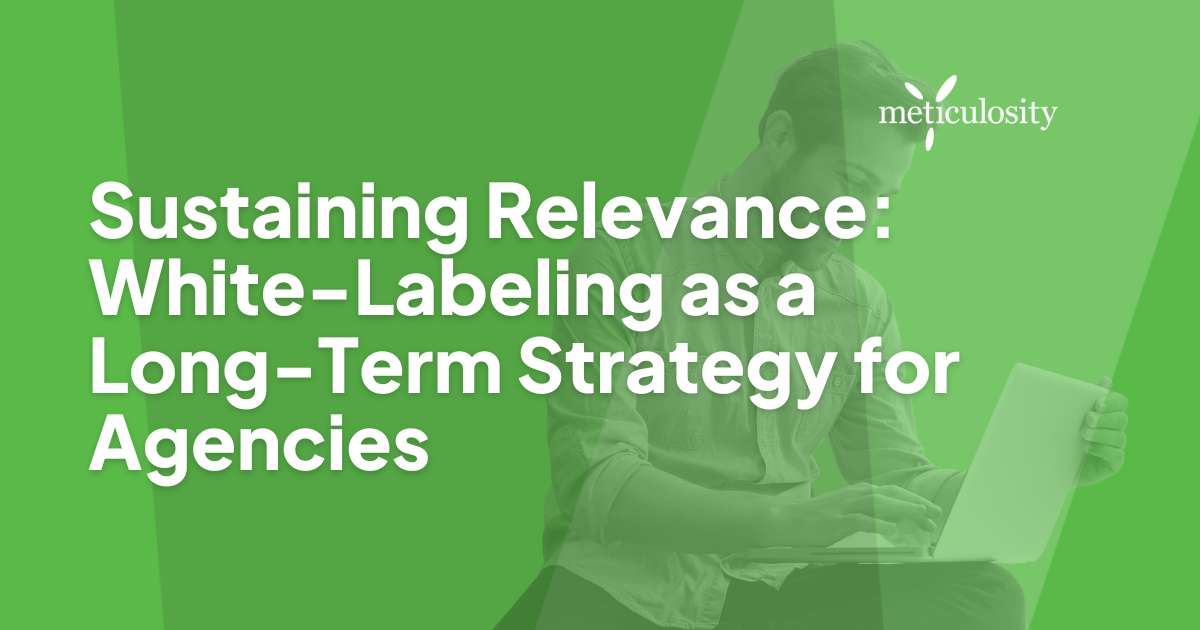Navigating the dynamic currents of today's market is a formidable task. Through careful research and personal experience, it has become clear that an astounding 70% of digital agencies are now broadening their horizons, incorporating services outside their primary skill set to keep their edge sharp.
Our deep dive into this trend revealed something unexpected: white-labeling, a powerful strategy with untapped potential for agencies aiming at long-term vitality and expansion. Let’s peel back the layers together; you might find embracing white-labeling is easier than anticipated and a true game-changer for your agency’s future.
Key Takeaways
- White-labeling lets agencies sell products or services made by others with their brand on them.
- It can help businesses grow and meet customer needs better without making everything themselves.
- Picking the right partners who share your values and focusing on quality is key for white-labeling to work well.
- White-labeling can create win-win situations, but staying true to your brand and keeping control of the quality is important.
- By using white-labeling, agencies can offer more without spending a lot on new things or skills. They stay important in the market this way.
Understanding White-Labeling
White-labeling is a business practice where one company produces goods or services to be rebranded and resold by another company. It's gaining traction among agencies as a cost-effective way to offer specialized expertise and solutions without having to build them in-house.
The benefits for both parties involved make it an attractive long-term strategy for sustained relevance in the market.
What is White-Labeling?
White-labeling is when you make a product or service and let another company put their brand on it to sell as their own. It's like making a cake and letting someone else put their name on the box.
They get to offer something great without making it from scratch, saving time and money.
This approach is smart for businesses that want to grow fast and focus on what they do best. When you white-label your offerings, you can pair up with other companies with strong brands that need what you've got.
It’s a win-win: they get cool stuff to sell, and you get more people using your products without having to market them yourself.
Why is it becoming more popular among agencies?
Agencies are always looking for ways to stay ahead. White-labeling helps with this. It lets them offer more services without having to make everything themselves. This means they can grow faster and meet their client's needs better.
It's also great because it saves time and money.
Looking to empower your agency? You can learn more here.
White-Labeling: Pros and Cons
White-labeling offers agencies the advantage of expanding their service offerings without having to invest in additional resources or expertise. However, potential drawbacks include the risk of diluting brand identity and losing control over quality and customer experience.
Advantages of White-Labeling
White-labeling offers several advantages for agencies looking to sustain relevance and achieve long-term success. Here are some key benefits:
- Expanding service offerings without the need for in-house development, allowing for scalability and flexibility.
- Accessing specialized expertise and resources that may not be available internally leads to innovation and customized solutions.
- Outsourcing non-core activities to focus on core competencies, maximizing efficiency and productivity.
- Leveraging established white-label providers' reputation and credibility to enhance the agency's brand image and market position.
- Meeting diverse client needs by offering a wider range of services through collaborative partnerships, ultimately driving business growth and success.
Potential drawbacks
While white-labeling offers numerous advantages, it's important to be aware of potential drawbacks. Here are some potential challenges and how to overcome them:
- Reduced control over the final product may lead to compromised quality.
- Maintaining consistent branding and customer experience across different white-labeled products or services is difficult.
- The risk of over-reliance on white-label partners could impact agility and adaptability.
- Potential conflicts of interest between the agency and the white-label provider, especially when serving similar clients.
- Limited ability to customize or tailor solutions to meet specific client needs.
The importance of maintaining a strong brand identity
Maintaining a strong brand identity is crucial for long-term success in white-labeling. Consistency in branding helps build client trust and recognition, reinforcing your agency's expertise and reliability.
It ensures that the products or services delivered under your brand uphold the same high standards, fostering loyalty and confidence among your client base.
Safeguarding your brand identity also sets you apart from competitors, showcasing your unique value proposition to potential partners and clients alike. Prioritizing a consistent representation of your agency's values and messaging strengthens market positioning, supporting sustainable growth through differentiation and recognition.
Long-Term Growth with White-Labeling
Establishing partnerships with white-label providers and aligning with company values are crucial for sustained growth in the long run. If you want to learn more about how white-labeling can help your agency stay relevant, keep reading!
Establishing partnerships with white-label providers
To ensure the success of white-labeling, it's vital to establish strong partnerships with white-label providers. Collaborating with providers who share similar values and quality standards is crucial for long-term sustainability.
Clear communication and transparency in roles and responsibilities are key to building a successful partnership while prioritizing honesty and continuous improvement helps in achieving sustainable growth.
Additionally, aligning with providers who specialize in customization can further enhance the overall client experience, making it essential to choose partners that fit your agency's specialization needs.
By choosing the right white-label partners based on shared values, effective communication, and a focus on customization, we can create sustainable business growth while meeting client demands.
Aligning with company values
As a marketer or business professional, aligning with your company's values is crucial when considering white-labeling as a long-term strategy. It's essential to ensure that the white-label partnerships you establish resonate with your agency's core principles and mission.
By choosing white-label providers whose values align with yours, you can maintain consistency in delivering products or services that reflect your brand's ethos and standards. This alignment reinforces your brand identity and cultivates trust among clients and partners, ultimately contributing to sustained relevance and success in the industry.
Incorporating company values into the selection process for white-label partnerships strengthens your agency's reputation and fosters meaningful collaborative relationships based on shared principles.

Implementing White-Labeling Effectively
Choosing the right partners for success, maintaining effective communication, and ensuring high-quality results consistently are essential strategies for long-term success with white-labeling.
To learn more about how to effectively implement white-labeling as a long-term strategy for agencies, see the content below.
Choosing the right partners for success
Selecting the right partners is crucial for successful white-labeling. Look for providers who align with your company values and share a commitment to quality. Effective communication is key, so prioritize those who maintain open and clear channels.
When considering potential partners, ensure they can consistently deliver high-quality results. Establishing a strong partnership relies on shared goals and values to drive long-term success.
Collaborate with providers that are dedicated to maintaining transparency, honesty, and continuous improvement in their processes.
Maintaining effective communication
Maintaining effective communication is vital for successful white-labeling partnerships. Regular and clear communication with your white-label providers helps align goals, understand project requirements, and address any challenges that may arise swiftly.
This includes setting up regular check-ins, being open to feedback, and ensuring all stakeholders are on the same page throughout the process.
Open dialogue between both parties also aids in maintaining quality standards and meeting client expectations consistently. By sharing relevant information transparently and proactively, potential issues can be addressed before they escalate, leading to a smoother partnership experience overall.
Ensuring high-quality results consistently
Consistently ensuring high-quality results is crucial to the success of white-labeling partnerships. By setting clear expectations and quality standards from the outset, both parties can work toward maintaining a reputation for excellence and reliability.
Regular performance assessments and feedback exchanges help identify areas for improvement, foster continuous growth, and reinforce trust with clients.
Focusing on quality control processes, leveraging best practices in project management, and staying updated on industry trends are essential to upholding high-quality outcomes consistently.
These efforts contribute significantly to bolstering client satisfaction levels while strengthening the long-term viability of white-labeling relationships.
Strategies for long-term success
Ensuring high-quality results consistently is pivotal in reaping long-term success with white-labeling. To achieve this, it's crucial to focus on building enduring partnerships with reliable white-label providers who align with our company values.
Choosing partners that share our commitment to quality and innovation can significantly contribute to sustained growth and client satisfaction. Additionally, maintaining open and effective communication channels with the white-label partners is essential for upholding high standards and ensuring that the end products meet or exceed client expectations.
Furthermore, a key strategy for long-term success involves continuously reviewing and improving our processes. This includes regular evaluation of the partnership dynamics, refining operational workflows, and adapting to changing market trends or client demands.
Best Practices for Successful White-Labeling
Establishing clear roles and responsibilities is critical for successful white-labeling partnerships. Prioritizing transparency and honesty and continuously reviewing and improving processes are also key best practices for sustained relevance in the industry.
Establishing clear roles and responsibilities
In white-labeling, it's crucial to establish clear roles and responsibilities from the get-go. This ensures that everyone knows what is expected of them and can work efficiently toward common goals.
Clarity is maintained by clearly defining each party's role and responsibility, leading to smoother workflows and better outcomes for all involved. It also helps avoid misunderstandings or conflicts, fostering a more productive and harmonious working relationship.
Clarity in roles minimizes confusion, allows for accountability, and promotes a sense of ownership in delivering quality results consistently. It creates a solid foundation for effective collaboration between agencies and their white-label partners while aligning with company values and maintaining client satisfaction throughout the process.
Prioritizing transparency and honesty
In white-labeling, prioritizing transparency and honesty is essential for building strong partnerships. Communicating expectations, capabilities, and potential challenges with your white-label partners is important.
Being open about strengths and limitations helps establish trust and prevent misunderstandings down the line. Honesty about pricing, quality standards, and delivery timelines also fosters a healthy working relationship that benefits both parties.
Transparency plays a crucial role in maintaining integrity throughout the white-labeling process. Keeping clients informed about the use of white-label services ensures ethical practices and reinforces their trust in your agency's commitment to delivering high-quality work consistently.
Continuously reviewing and improving processes
To ensure the long-term success of white-labeling partnerships, it's crucial to prioritize transparency and honesty. This creates a foundation for trust and open communication, setting the stage for continuously reviewing and improving processes.
By regularly evaluating the effectiveness of workflows and identifying areas for enhancement, businesses can adapt to changing industry needs, keep up with market trends, and meet client demands.
Embracing a culture of continuous improvement fosters innovation and positions agencies for sustained relevance in today's dynamic business landscape.
As part of successful white-labeling strategies, staying open to feedback from all stakeholders aids in identifying opportunities for refinement. Implementing a system that allows for regular assessment and adaptation ensures that processes remain agile and responsive to evolving client expectations.

Conclusion
In conclusion, white-labeling offers agencies a long-term strategy for sustainable growth. By understanding its pros and cons and implementing it effectively, agencies can build strong client relationships and adapt to changing industry needs.
Overcoming potential challenges through best practices can help maintain transparency, improve processes, and ensure high-quality results consistently. With strategic white-label partnerships, agencies can stay relevant in the market while focusing on their core competencies for future success.
Click here to learn more about agency marketing.
FAQs
1. How does white-labeling contribute to the long-term relevance of marketing agencies in a rapidly evolving industry landscape?
-
- Agile Service Offerings: White-labeling allows agencies to rapidly adapt and evolve their service offerings, ensuring they remain relevant in changing market conditions.
- Access to Emerging Trends: By partnering with white-label services, agencies can stay updated on emerging trends and technologies, staying ahead of the curve.
2. Can you provide examples of agencies that have successfully used white-label services as a long-term strategy to stay competitive and relevant?
-
- Strategic Partnerships: Agencies share how strategic partnerships through white-labeling have been integral to their sustained success.
- Industry Recognition: Examples of agencies that have gained industry recognition for their innovative and relevant solutions facilitated by white-label services.
3. How can agencies use white-labeling to continuously innovate and introduce new services, ensuring they meet the ever-changing needs of their clients?
-
- Market Intelligence: White-label partnerships provide access to market intelligence, helping agencies identify new opportunities for innovation.
- Testing New Ideas: Agencies can test new ideas and services through white-labeling before fully integrating them into their offerings, minimizing risks.
- Client Feedback Integration: Client feedback obtained through white-label initiatives can inform the development of innovative solutions that align with evolving client needs.
4. In what ways does white-labeling contribute to the overall stability and longevity of marketing agencies, ensuring their continued success in the industry?
-
- Diversification of Revenue Streams: White-label services contribute to the diversification of revenue streams, enhancing financial stability for agencies.
- Client Retention: The ability to adapt and provide innovative solutions through white-labeling supports client retention, contributing to the long-term success of agencies.
- Strategic Resource Allocation: Agencies can strategically allocate resources by leveraging white-label partnerships and optimizing operations for long-term sustainability.
White-labeling serves as a strategic and long-term approach for marketing agencies, allowing them to sustain relevance, adapt to industry changes, and continually provide innovative solutions to meet client needs.








